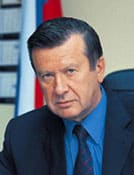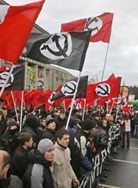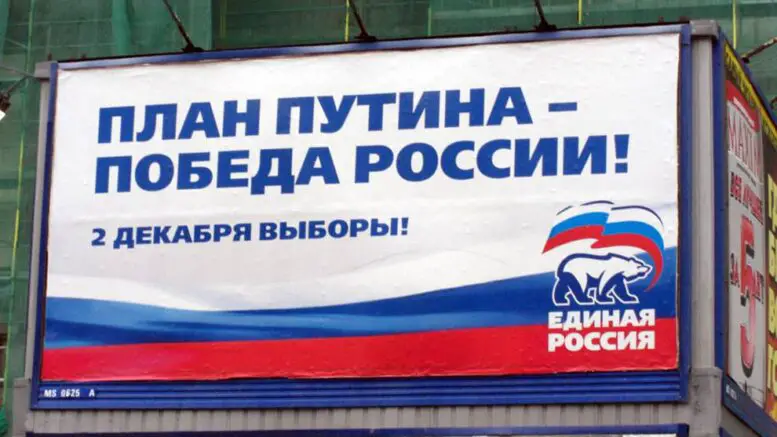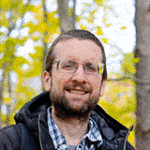An Annotated Overview of Quotes about Putin’s Decision to Head United Russia’s Party List in the Coming Elections
As political analysts endlessly mulled the “Problem of 2008,” in which they batted the names Ivanov” and “Medvedev,” the two politicians considered to be most likely to succeed President Putin, across the grand ping-pong table of political theory, President Putin himself threw a basketball into the net. When he announced that he would head United Russia’s list of political candidates, suddenly all the rules of the game, and indeed the game itself, changed.
Many analysts responded with the theory that President Putin had struck upon a way to constitutionally stay in power. This theory was expressed, for example, by James Fenkner of Red Star Asset Management in a statement given to BBC News on October 1st:
“It looks to me a very elegant way to sidestep the constitutional limits of two terms. So what Putin does is becomes the prime minister and then Zubkov, who is older, could step down – for say an illness – and Putin can come back as acting president, runs and then becomes president for another term or two. For those people who believe stability overweighs everything, it is good. The market will take it well.”
Most Western analysts have also inferred, if not outright stated, that this means Russia will continue “backsliding” into a new dictatorship, such in the Economist’s editorial board statement from October 1st. This piece generally confirmed Mr. Fenkner’s theory and stated that “some Russians” are “unsettled” with “the dilute democracy that their own leaders allow them.”
However, if Russians are unhappy with Putin’s rule, polls certainly have not shown this. In fact, a poll taken by the All-Russian Public Opinion Research Center just a few days after Putin’s announcement showed United Russia gain seven points over its previous poll results two weeks before. Furthermore, this gain came at the expense of every other party, showing that a relatively wide range of Russians were moving to support the party with which Putin had officially aligned.

Victor Zubkov was picked to be Russia’s new Prime Minister. The late changes to Russia’s government and Zubkov’s obscurity have fueled theories that Putin may try to retain political power after his term expires. Photo from the government of the Russian Federation.
The reasoning used by the poll respondents is one that can be largely explained with a quote from Moscow’s Mayor Yuri Luzhkov, given in an interview with Rossiiskaya Gazeta on October 2nd. “(Putin’s choice is) a great decision that guarantees us stability. It’s vital for Russia to avoid standing still or descending into chaos.” Russians are tired of political and economic uncertainty and see Putin, who has reigned over nearly eight years of economic growth, as the man who can keep the country – and Russians’ individual welfare – on track. While he is often known for putting his political foot in his mouth with firebrand statements about gays and foreign institutions, Mayor Luzhkov is often in tune with the thoughts and opinions of the average Russian.
Whether or not this logic is correct, many are theorizing that Putin’s decision is not such a bad one. Gennadiy Zyuganov, the leader of the Communist Party of the Russian Federation (KPRF), stated in an interview with Interfax on October 1st that “Putin’s decision to head United Russia is the confirmation of a real two-party system in the country: on the left flank there is the KPRF and on the right flank there is United Russia.” Indeed, if to believe the latest polls in light of Russia’s new election rules, which state that parties must receive at least 7% of the vote to gain representation in the government, the only viable parties in Russia are United Russia and the Communists. The Russian opposition will be forced to consolidate – a move the opposition has been trying to make for sometime – if it wishes to retain political representation. Consolidating into the Communist Party would be one expedient action – but forming a coalition party among members of other parties, who each have a few percent of the vote, is also still a viable option.
Others also theorize that the move could result in better political stability and democratic development for Russia by creating two power centers: one within the office of the president and the other in whatever office Putin moves to. Gleb Pavlovsky, head of the Effective Politics Foundation, said in an interview with Interfax on October 1st that Putin’s choice
“is the most logical decision… After May 2008, the president will cease to be the only all-mighty figure in the country. This is a revolutionary step. For the first time since 1991, the center of influence may shift from the Kremlin. The president will remain in the Kremlin, but will not necessarily be a national leader… After the 2008 presidential election, power and leadership will be distinguished as two different political phenomena. This is a very serious step towards a real pluralism in the country.”
Alexei Mukhin, director of the Center for Political Information in Moscow, elaborated on this theory, saying that:
“We expect some constitutional changes that will strengthen the hand of the prime minister and weaken that of the president… Essentially, we shall see a president who concerns himself with foreign affairs and ceremonial head of state functions, while domestic policy will be handled by the government – which means Putin.”
This theory has also been given positive air by some Western media as well, such as Fred Weir in his October 3rd article for the Christian Science Monitor entitled “Putin Plan,” which reported the above statement by Mukhin.
Besides this particular “bifurcation” theory of the results of Putin’s decision, there are also many others. Most envision Putin remaining influential by taking up some political position or becoming active in one of Russia’s major commercial enterprises:
-
“I personally do not believe that Putin could become prime minister under a new president. It looks like we are moving to a situation when, under the new president, Putin will be a parliament majority leader.”
– Boris Mararenko, Center for Political Technologies, statement as reported by BBC News on October 1st.
-
It’s hard to imagine Putin would become prime minister after being a super-popular president. The dual system is bad for Russia – Putin must be worried, looking at the situation and the way it works in the Ukraine. He could become party leader of United Russia – ie someone popular who would influence what’s going on, but if he chose to remain outside the prime ministerial and presidential positions, he would not want to be junior to the president. Of course to make all this work, and for Putin to be the most senior figure, the constitution would have to be changed, and Putin has always made it clear he wants no changes to the constitution.
– Andrei Ryabov, Carnegie Moscow Center, statement as reported by BBC News on October 1st.
-
“Of course (Putin) will remain in power. No doubt about that. He will leave the presidency with tremendous public support. One could expect that he will be back in 2012… (but) I do not think that he will become prime minister. If he does he would have to bear responsibility for all possible failures. This is a lot of risk. It is likely that Putin will ‘reign but not rule’. It is possible he will hold an influential position in the economic sector,”
– Sergei Karaganov, head of the Foreign and Defense Policies Council, at an investment conference organized by Troika Dialog in New York on October 4th.

Other Russia, a consortium of opposition parties, often complains of oppression. The National Bolsheviks, pictured above, are banned in Russia, but are one of the consortium’s more vocal members.
Of course, not all Russians are optimistic about Putin retaining influence. Tanya Lokshina of the Russian rights group DEMOS said at a news conference on October 3rd that “With Putin’s announcement… the presidential elections lost whatever meaning they could have possibly had… The Russian Federation will not vote for a president, it will vote for an assistant to Mr. Putin, who will remain the boss.”
This plethora of theories proves only that no one really knows what exactly will happen after 2008. This difficulty in foreseeing what Putin’s plans, which Putin has kept carefully open-ended, may be is likely why most major political figures in the US have remained mum on the issue. No politician wants be proved wrong in their political analysis, and none wants to be held internationally political responsible for opinions expressed before they can be proved correct. For example, when U.S. Secretary of State Condoleezza Rice was grilled for her opinion on the subject at a conference with Russian activists, her response was limited to “There’s a lot of speculation about who’s going to be president, whether Putin is going to take any number of jobs or no job at all. I just think speculating on that is not going to help the situation.” Although she did add that “I think there is too much concentration of power in the Kremlin.” However, as we’ve seen above, Putin’s plan may actually be a cure for her complaint about Russia.
We can infer that Putin will most likely remain influential and politically active – his new affiliation with United Russia would logically infer that. However, in exactly what capacity he will be politically active, and what impact that this will have on Russia’s politics – and by extension, economy – is anyone’s guess. The Russian political field is much larger and much more complex the tiny ping-pong table that many once held it to. The only thing that can be said for certain is that the upcoming elections in Russia will hold political surprises and that they will be watched closely by the increasing number of western businessmen who have invested an increasing amount of money in the booming Russian economy.



